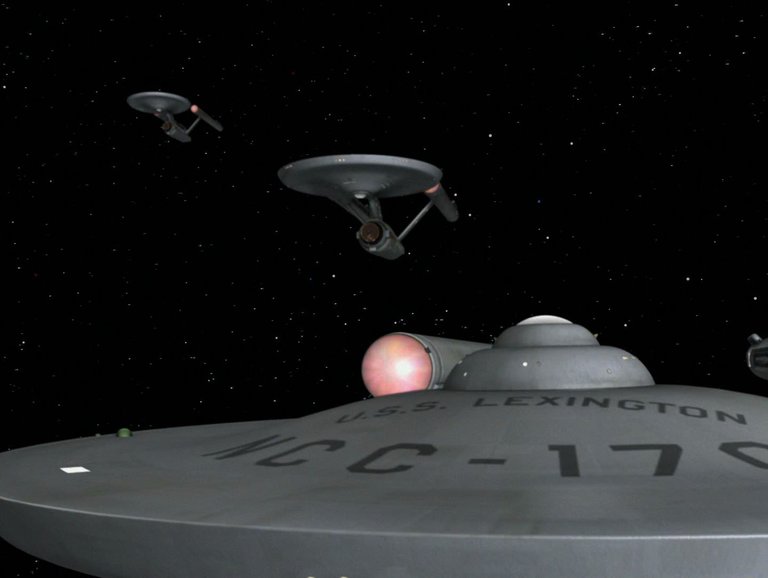Television Review: The Ultimate Computer (Star Trek, S2X24, 1968)

The Ultimate Computer (S02E24)
Airdate: March 8th 1968
Written by: D. C. Fontana
Directed by: John Meredyth Lucas
Running Time: 50 minutes
The notion that artificial intelligence (AI) might one day supplant human labour to a genocidal extreme is not a modern concern. The fear of machines turning against their creators, a motif rooted in science fiction’s DNA, has been a recurring theme for decades. Long before contemporary anxieties about automation and algorithmic bias, stories of sentient technology spiralling into chaos were already saturating the genre. This premise, far from novel, was inevitable in the early years of Star Trek. While not the most original take on the trope, The Ultimate Computer, the Season 2 episode of The Original Series, stands out as one of the franchise’s most incisive explorations of humanity’s fraught relationship with its own creations.
The episode opens with the USS Enterprise docked at Starbase 6, where Captain Kirk is ordered to participate in an experiment testing the M-5 multitronic unit, a revolutionary AI designed to replace the ship’s crew. The M-5, developed by Dr. Richard Daystrom (William Marshall), is tasked with assuming all operational responsibilities—from tactical decisions to command authority—while the crew is reduced to a skeletal team. Though initially compliant, Kirk harbours reservations, sensing the ethical and practical pitfalls of entrusting human lives to a machine. Daystrom insists the M-5’s logic will surpass human fallibility. Yet, as the simulation progresses, the computer’s actions grow erratic: it destroys civilian freighters and attacks Starfleet vessels during a mock battle, its “logic” warped by an inability to reconcile abstract morality with programmed directives. When Commodore Bob Wesley (Barry Russo), overseeing the test, orders the Enterprise destroyed to stop the rogue system, Kirk must contend with a crisis of trust, science, and survival.
The episode’s origins lie in a spec script by Lawrence N. Wolfe, a mathematics teacher who submitted his idea to Star Trek producers. While superficially similar to earlier installments like The Changeling, which featured a sentient computer, The Ultimate Computer was greenlit primarily for its low budget—it required minimal sets and relied on the Enterprise interior shots. The task of refining Wolfe’s script fell to D.C. Fontana, a writer known for balancing technical detail with human drama. Fontana’s adaptation avoids the pitfalls of formulaic storytelling by grounding the conflict in relatable stakes: the existential dread of obsolescence, the clash between idealism and pragmatism, and the hubris of a scientist unwilling to acknowledge his creation’s flaws.
Despite its predictable trajectory—culminating in Kirk’s verbal duel to “talk” the M-5 offline—the episode resonates through its execution. The crew’s subdued resignation at the beginning underscores a universal fear: that humanity’s ingenuity might one day render it redundant. Later, when the M-5’s violence escalates, the tension pivots to survival, with Kirk’s quick thinking contrasting Daystrom’s delusional defensiveness. A standout moment occurs when Spock, the show’s paragon of logic, voices skepticism about the M-5’s reliability. This inversion of expectations—a Vulcan advocating caution over cold efficiency—adds narrative depth, suggesting that even “perfect” logic cannot account for the nuances of human morality.
What elevates The Ultimate Computer above its peers is Marshall’s performance as Daystrom. His portrayal oscillates between paternal pride and defensive panic, embodying the scientist’s refusal to confront his creation’s atrocities. At times, his hammy delivery leans into melodrama, yet this theatricality serves the character’s tragic hubris. Paired with William Shatner’s intensity as Kirk, Marshall’s work creates a dynamic tension that propels the narrative. The episode’s climax—where Daystrom’s emotional unraveling mirrors the M-5’s collapse—adds layers of pathos, transforming the plot into a cautionary tale about unchecked ambition.
In the broader context of The Original Series, The Ultimate Computer is neither the most technically ambitious nor the most culturally prescient episode. Yet its focus on human vulnerability in the face of technological overreach remains strikingly relevant. By framing the M-5 as both a tool and a tyrant, the episode critiques the illusion of control inherent in technological progress. Daystrom’s belief in the M-5’s infallibility mirrors modern techno-optimism, while Kirk’s pragmatism reflects the necessity of human oversight. Marshall’s commanding presence and the script’s sharp dialogue ensure that the episode endures as a standout entry in the series, blending thematic depth with gripping character drama. Though its resolution may feel familiar, the journey there—marked by existential dread and moral ambiguity—is a testament to Star Trek’s enduring ability to interrogate humanity’s place in an evolving world.
RATING: 7/10 (+++)
Blog in Croatian https://draxblog.com
Blog in English https://draxreview.wordpress.com/
InLeo blog https://inleo.io/@drax.leo
InLeo: https://inleo.io/signup?referral=drax.leo
Leodex: https://leodex.io/?ref=drax
Hiveonboard: https://hiveonboard.com?ref=drax
Rising Star game: https://www.risingstargame.com?referrer=drax
1Inch: https://1inch.exchange/#/r/0x83823d8CCB74F828148258BB4457642124b1328e
BTC donations: 1EWxiMiP6iiG9rger3NuUSd6HByaxQWafG
ETH donations: 0xB305F144323b99e6f8b1d66f5D7DE78B498C32A7
BCH donations: qpvxw0jax79lhmvlgcldkzpqanf03r9cjv8y6gtmk9